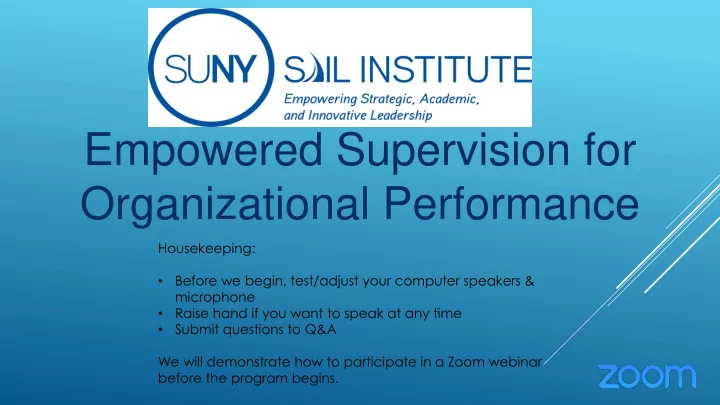

Empowered Supervision for Organizational Performance Housekeeping: Before we begin, test/adjust your computer speakers & • microphone Raise hand if you want to speak at any time • Submit questions to Q&A • We will demonstrate how to participate in a Zoom webinar before the program begins.
Housekeeping: Participation & Interaction
Upcoming Workshops: SAVE 10% CODE TYWEBINAR
This webinar is a sneak peek to our in person workshop on Wednesday, October 24 th First, some insight into understanding our unionized environment a bit better.. Liesl Zwicklbauer, Associate Vice Chancellor for Employee Relations (Poll) Today I will be talking about 5 key areas for empowered supervision: 1. understanding the stages and dynamics of group MaryAnn Stark development Leadership Consultant 2. the difference between staff supervision and staff development 3. introducing you to a staff coaching model 4. guidelines for effective feedback 5. some motivation techniques WELCOME!
To begin, tell me what kind of problems do you typically face with staff members? Please type those in the chat box now if you can…. What skills would you like to learn that would help you handle these problems better? Please jot those down for yourself and feel free to add those to the chat box as well if you like… TYPICAL PROBLEMS
A sense of belonging Have a share in planning Feel that the goals are achievable Feel that what they are doing really matters and is valued Share in making the rules of the group Need to know what is expected Want to be challenged Want to see that progress is being made Be kept informed of what’s going on Have confidence in the leader based upon fair treatment, recognition, and trust BASIC NEEDS OF PEOPLE IN GROUPS
STAGES OF GROUP DEVELOPMENT Forming Awareness: Commitment Acceptance Storming Conflict: Clarification Belonging Norming Cooperation: Involvement Support Performing Productivity: Achievement Pride
Where are you spending your time? MANAGEMENT VS. LEADERSHIP Administer Innovate Maintain Challenge Supervise Develop Short term view Long term view Control Inspire Ask how and when Ask what and why Do things right Do the right thing
ORGANIZATIONAL CHANGE Group Behavior (High) Individual Behavior Difficulty Attitudes Knowledge (Low) (Short) (Long) Time Involved
ORGANIZATIONAL CHANGE Group Behavior (High) Individual Behavior Performing Norming Difficulty Attitudes Storming Knowledge (Low) Forming (Short) (Long) Time Involved
SO WHY DON’T PEOPLE JUST DO WHAT THEY ARE SUPPOSED TO DO!?
STAFF COACHING & ACCOUNTABILITY Assessment Clarify Roles Instruct or Confront or teach a new Resolve a skill Problem Commitment
FEEDBACK DEFINED Should not be: Should be: Given with positive Given to retaliate intent Indirect Direct General/vague Specific Judgmental Focus on behavior not Delayed personality Attacking Timely Impulsive Supportive Disrespectful Thoughtful Considerate
TIPS & STRATEGIES FOR MOTIVATING OTHERS Expect the Best! People will live up to expectations. Clearly define them and discuss. Reward the desired behavior and vary them Have Fun and create a fun, light work environment Tailor your efforts to individual likes and needs Revitalize employees with wellness programs… nutrition, exercise, use vacation time, organization * Engage them! Let them help with problem solving, brainstorming sessions, and goal setting Take the time to get to know them both personally and professionally. Create developmental action plans. Role model the behavior you expect Empower them by delegating challenging and meaningful work. * Give them autonomy and independence: Hire the right people and get out of their way! Recognize, Praise and Thank Be open to flexible schedules and work environment to promote work/life balance *
Go back to my first question to you… the typical problems you are having and the skills you think you need to face them. Perhaps something I said today gave you a great idea on how to approach it or think differently about it. If not then please… Come to our in person workshop on October 24 th to learn more! Register at www.suny.sail.edu We will dive deeper into all of these topics Practice our newly learned skills with interactive role plays Leave with individualized 21 day Action Plans to implement Questions? • IN CONCLUSION…
Recommend
More recommend